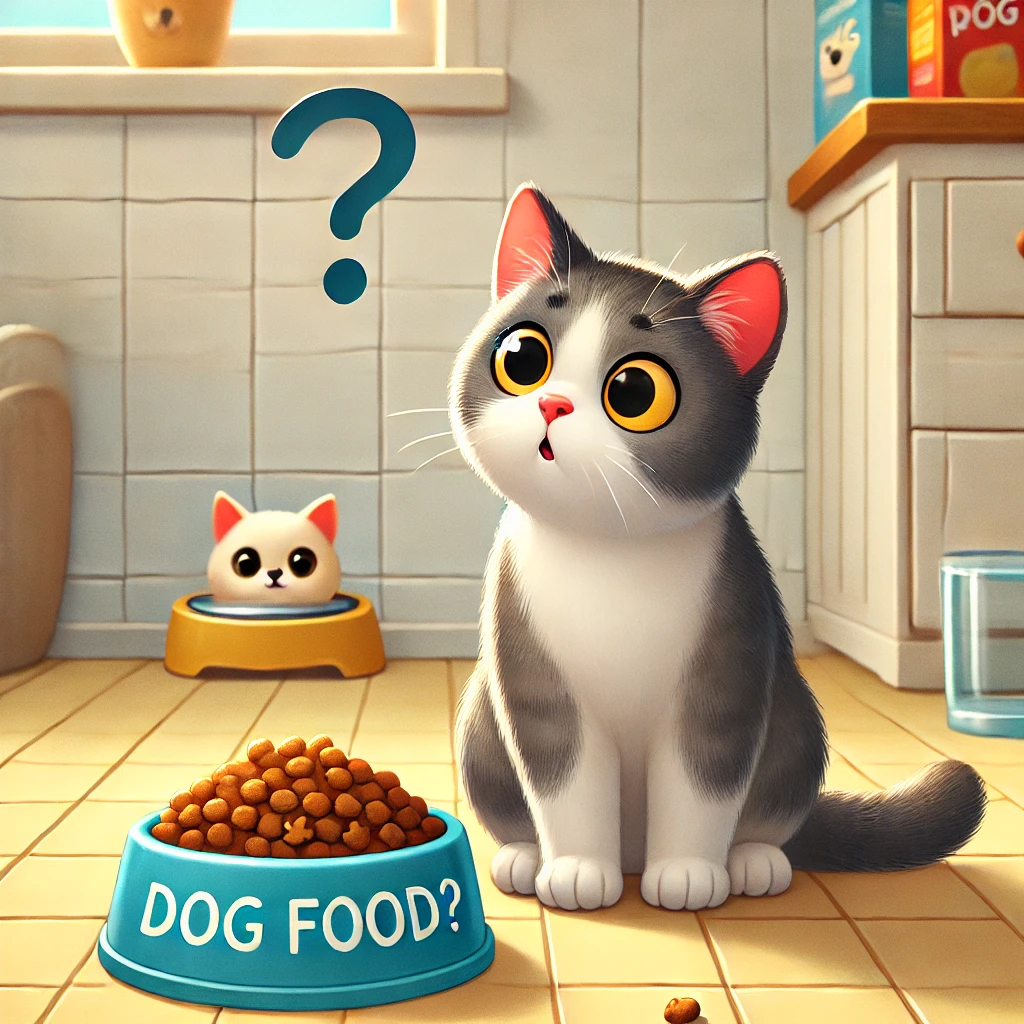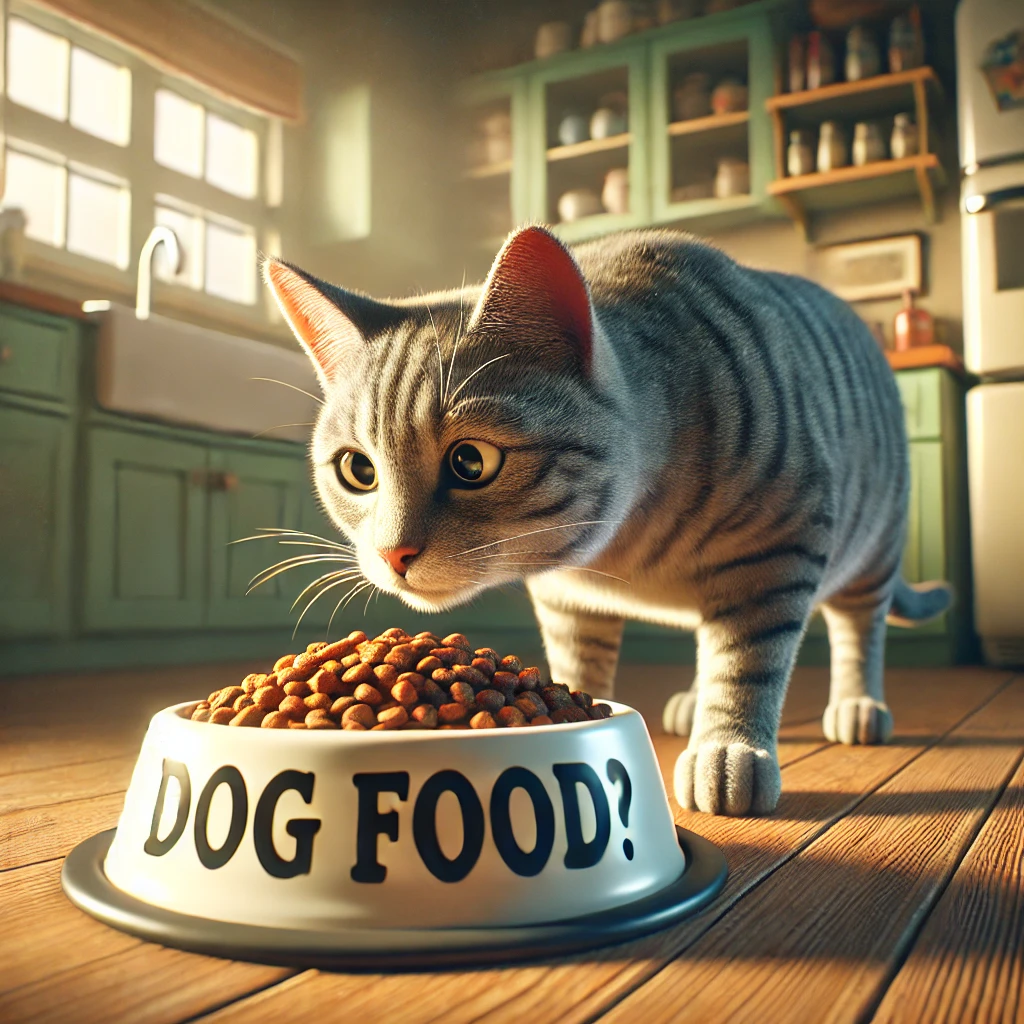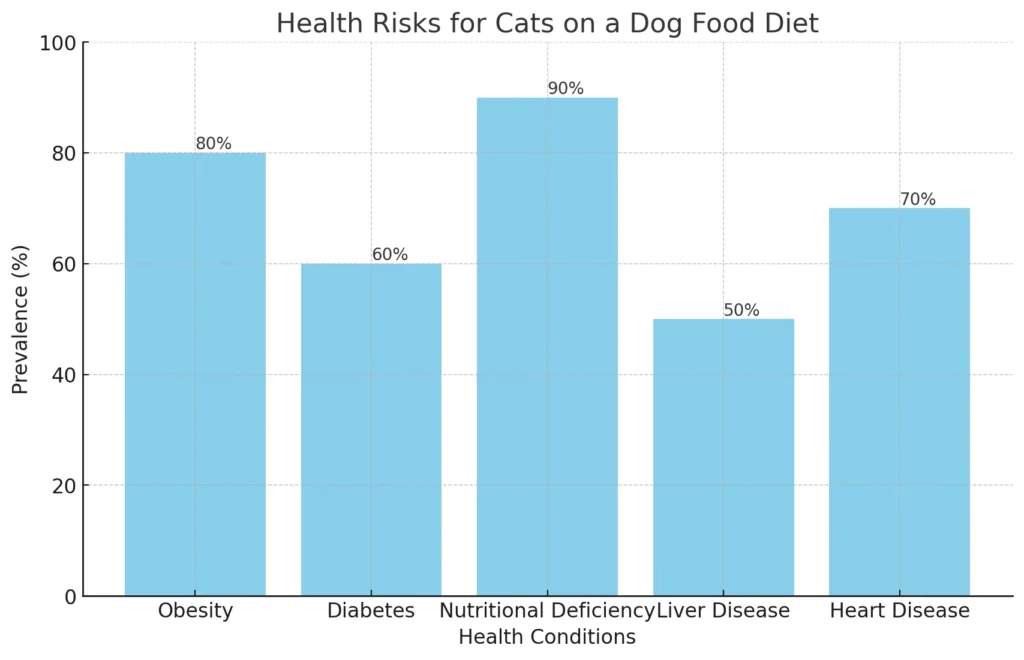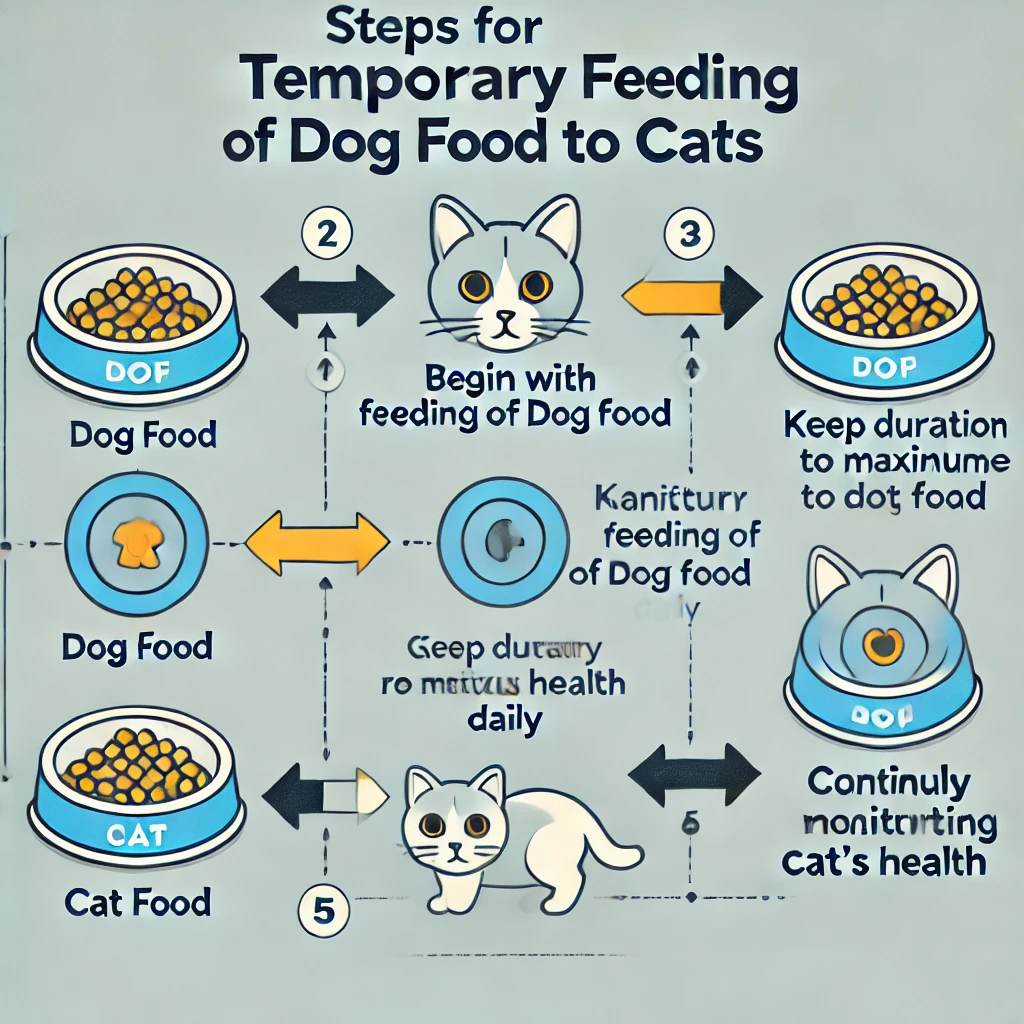can cats eat dog food?

Pet owners frequently face situations where convenience might prompt them to consider cross-feeding between cats and dogs. The question “Can cats eat dog food?” is not just about whether they will consume it, but whether they should. The answer to the question “Can cats eat dog food?” is cats can eat dog food occasionally, but it should not be a regular part of their diet as it lacks essential nutrients they need. This article addresses the nutritional needs of cats versus dogs, explores the potential health risks of feeding cats dog food, and provides guidelines for pet owners about how to manage such situations responsibly.
Understanding the Nutritional Needs of Cats and Why Dog Food Doesn’t Suffice
Can Cats Eat Dog Food Regularly?
The diet of an obligate carnivore—like cats—differs fundamentally from that of omnivores—including dogs. Cats require specific nutrients in higher quantities than dogs, including protein and certain amino acids like taurine, which are crucial for their health. The inquiry “Can cats eat dog food?” often arises out of convenience or emergency. However, the long-term feeding of dog food to cats can lead to significant health issues due to the lack of essential nutrients.

Critical Nutrients Missing in Dog Food
- Taurine: Cats need taurine for heart health, vision, and reproduction. Unlike dogs, cats cannot synthesize enough taurine from other dietary sources, which is why dog food, typically low in taurine, is inadequate.
- Vitamin A: Cats cannot convert beta-carotene from plant sources into vitamin A and must consume it directly in its active form. Dog food generally does not provide sufficient vitamin A for cats, making it unsuitable for their long-term diet.
Dietary Flexibility of Dogs Compared to Cats
Cats strictly require animal-based proteins and have a limited ability to digest plant-derived nutrients. On the other hand, dogs can adapt to a more varied diet and can even manage on diets that include substantial non-animal based nutrients. This explains why “Can dogs eat cat food?” is a less serious issue than its reverse, although it is not recommended due to high protein content in cat food which can lead to obesity and other health issues in dogs if fed regularly.
Table: Nutritional Comparison Between Cat and Dog Food
| Nutrient | Cat Food (Average %) | Dog Food (Average %) | Comments |
|---|
| Crude Protein | 30-40% | 20-30% | Cats require higher protein for energy and growth. |
| Fats | 10-20% | 10-20% | Both require fats but cats need specific fatty acids. |
| Carbohydrates | 5-15% | 30-70% | Cats have a lower carbohydrate need than dogs. |
| Vitamins | Varied per type | Varied per type | Cats specifically need more Vitamin A and taurine. |
| Minerals | Varied per type | Varied per type | Mineral needs are similar, but balance varies. |
Here, the table elaborates the percentages of crude protein, fats, carbohydrates, vitamins, and minerals found in both cat and dog food, illustrating the disparities that affect dietary suitability.
The Health Risks Associated with Cats Eating Dog Food
Can cats eat dog food? repercussions!
Feeding dog food to cats on a regular basis can lead to nutritional deficiencies that are not immediately apparent but can cause long-term health problems. This section answers “Why can’t cats eat dog food?” by detailing specific nutritional gaps and their implications.
Gastrointestinal and Metabolic Issues in Cats
“Is dog food bad for cats?” Yes, especially from a digestive perspective. Cats have a shorter digestive tract than dogs, which is optimized for high-protein, low-carbohydrate diets. Dog food typically contains higher levels of grains and other carbohydrates, leading to digestive upset, obesity, and diabetes in cats.
Graph: Health Risks for Cats on a Dog Food Diet

This graph displays data on the prevalence of obesity, diabetes, and other diet-related conditions in cats that are regularly fed dog food.
Emergency Situations: Can Cats Eat Dog Food Temporarily?
Managing Short-Term Dietary Substitutions
While it’s not ideal, in emergency situations where no cat food is available, dog food can temporarily sustain a cat. This section provides practical advice for such rare events, emphasizing the importance of transitioning back to cat food as quickly as possible to avoid health issues.
Diagram 1: Steps for Temporary Feeding of Dog Food to Cats

Here’s a summary of the steps for temporarily feeding dog food to cats:
- Begin with Emergency Feeding of Dog Food: Start feeding your cat dog food only if absolutely necessary and as a last resort.
- Monitor Cat’s Health Daily: Keep a close eye on your cat’s health each day while feeding them dog food to catch any adverse reactions early.
- Keep Duration to Maximum 2-3 Days: Limit the feeding of dog food to a short term, ideally no more than 2-3 days, to avoid nutritional deficiencies.
- Gradually Reintroduce Cat Food: Start mixing cat food with the dog food gradually, increasing the proportion of cat food over several days.
- Continue Monitoring Cat’s Health: After reintroducing cat food, continue to monitor your cat’s health to ensure they return to normal without lasting issues.
Do you know?
Miniature Schnauzers require specific care including regular grooming and proper nutrition to manage health issues like pancreatitis and diabetes, ensuring they remain healthy and vibrant.
can cats eat dog food?: Preventive Measures and Safe Alternatives
This section offers strategies to prevent ever needing to rely on dog food for feeding cats, such as maintaining a sufficient stock of cat food and exploring homemade diet options that meet all of a cat’s nutritional requirements.
- Homemade Meals: For those considering “Can I feed my cat dog food?”, this part should guide on how to prepare balanced meals at home, ensuring cats receive all necessary nutrients without resorting to inappropriate dog food.
Conclusion: Addressing the Question “Can Cats Eat Dog Food?”
The final section reiterates that while cats can physically consume dog food, it does not meet their specific dietary needs and can lead to serious health problems if fed consistently as part of their diet. The article concludes by emphasizing responsible pet ownership and the importance of adhering to species-appropriate diets.
Is it harmful for a cat to eat dog food?
Eating dog food occasionally is not harmful to cats, but it should not be a regular part of their diet. Dog food lacks essential nutrients that cats need, like taurine, arachidonic acid, and higher protein levels, which could lead to nutritional deficiencies if fed consistently.
What kind of dog food can cats eat?
Cats can eat dog food in an emergency situation, but it should not be a habit. If necessary, choose a dog food that is high in protein and does not contain harmful ingredients like garlic or onions.
What if I give dog food to my cat?
Giving dog food to a cat occasionally as a treat is usually safe, but it should not replace their regular cat food because it doesn’t meet their nutritional requirements.
Can dog food upset a cat’s stomach?
Yes, dog food can upset a cat’s stomach, especially if they are not used to it. It may cause gastrointestinal upset such as diarrhea or vomiting.
Why does my cat like dog food better?
Some cats may prefer the taste or texture of dog food. However, this preference doesn’t mean it’s nutritionally adequate for them.
What if I accidentally gave my dog cat food?
Accidentally feeding your dog cat food once is unlikely to be harmful, though cat food is higher in protein and fat, which could cause stomach upset or weight gain if eaten regularly by a dog.
Is it okay to mix cat food with dog food?
Mixing cat food with dog food occasionally for a quick fix is unlikely to cause harm, but this mix should not be a long-term solution for either pet due to differing nutritional needs.
Can cats get food poisoning from dog food?
Cats are unlikely to get food poisoning from dog food unless it is spoiled or contains toxic ingredients. However, consistent feeding of dog food can lead to nutritional deficiencies in cats.
What’s the difference between cat food and dog food?
The main difference lies in nutritional content. Cat food is generally higher in protein, taurine, and certain fatty acids that are essential for cats but not for dogs. Dog food typically has a lower protein content and may include ingredients that are not necessarily safe or suitable for cats.
